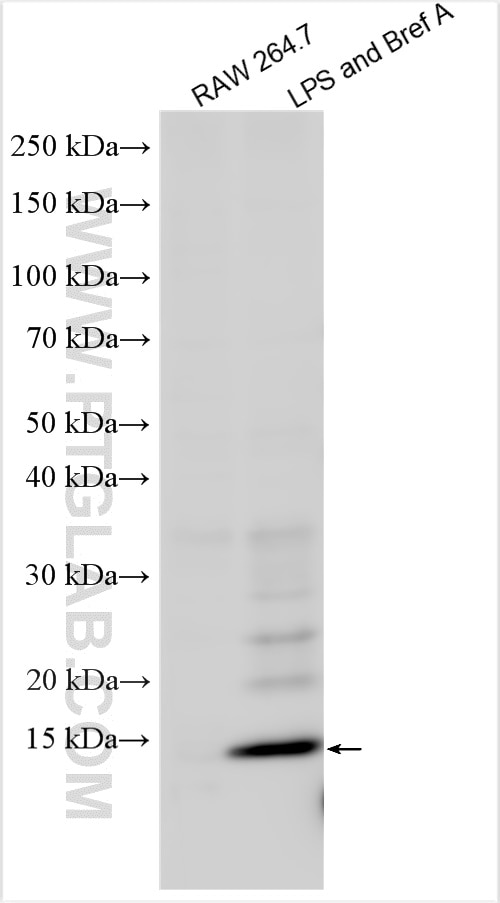TNF-alpha Polyklonaler Antikörper
TNF-alpha Polyklonal Antikörper für WB, ELISA
Wirt / Isotyp
Kaninchen / IgG
Getestete Reaktivität
Maus und mehr (1)
Anwendung
WB, IHC, IF, ELISA
Konjugation
Unkonjugiert
Kat-Nr. : 26162-1-AP
Synonyme
Geprüfte Anwendungen
| Erfolgreiche Detektion in WB | RAW 264.7-Zellen |
Empfohlene Verdünnung
| Anwendung | Verdünnung |
|---|---|
| Western Blot (WB) | WB : 1:500-1:1000 |
| It is recommended that this reagent should be titrated in each testing system to obtain optimal results. | |
| Sample-dependent, check data in validation data gallery | |
Veröffentlichte Anwendungen
| WB | See 6 publications below |
| IHC | See 2 publications below |
| IF | See 1 publications below |
Produktinformation
26162-1-AP bindet in WB, IHC, IF, ELISA TNF-alpha und zeigt Reaktivität mit Maus
| Getestete Reaktivität | Maus |
| In Publikationen genannte Reaktivität | Maus, Ratte |
| Wirt / Isotyp | Kaninchen / IgG |
| Klonalität | Polyklonal |
| Typ | Antikörper |
| Immunogen | TNF-alpha fusion protein Ag24089 |
| Vollständiger Name | tumor necrosis factor |
| Beobachtetes Molekulargewicht | 17 kDa |
| GenBank-Zugangsnummer | NM-013693 |
| Gene symbol | TNF-alpha |
| Gene ID (NCBI) | 21926 |
| Konjugation | Unkonjugiert |
| Form | Liquid |
| Reinigungsmethode | Antigen-Affinitätsreinigung |
| Lagerungspuffer | PBS with 0.02% sodium azide and 50% glycerol |
| Lagerungsbedingungen | Bei -20°C lagern. Nach dem Versand ein Jahr lang stabil Aliquotieren ist bei -20oC Lagerung nicht notwendig. 20ul Größen enthalten 0,1% BSA. |
Hintergrundinformationen
TNF, as also known as TNF-alpha, or cachectin, is a multifunctional proinflammatory cytokine that belongs to the tumor necrosis factor (TNF) superfamily. It is expressed as a 26 kDa membrane bound protein and is then cleaved by TNF-alpha converting enzyme (TACE) to release the soluble 17 kDa monomer, which forms homotrimers in circulation. It is produced chiefly by activated macrophages, although it can be produced by many other cell types such as CD4+ lymphocytes, NK cells, neutrophils, mast cells, eosinophils, and neurons. It can bind to, and thus functions through its receptors TNFRSF1A/TNFR1 and TNFRSF1B/TNFBR. This cytokine is involved in the regulation of a wide spectrum of biological processes including cell proliferation, differentiation, apoptosis, lipid metabolism, and coagulation. Mouse and human TNF-alpha share 79% amino acid sequence identity. Unlike human TNF-alpha, the mouse form is glycosylated. In mouse deficiency of this gene is associated with defects in response to bacterial infection, with defects in forming organized follicular dendritic cell networks and germinal centers, and with a lack of primary B cell follicles.
Protokolle
| PRODUKTSPEZIFISCHE PROTOKOLLE | |
|---|---|
| WB protocol for TNF-alpha antibody 26162-1-AP | Protokoll herunterladen |
| STANDARD-PROTOKOLLE | |
|---|---|
| Klicken Sie hier, um unsere Standardprotokolle anzuzeigen |
Publikationen
| Species | Application | Title |
|---|---|---|
Biochem Biophys Res Commun Uric acid-lowering effect of harpagoside and its protective effect against hyperuricemia-induced renal injury in mice | ||
J Control Release Microenvironment-responsive nano-bioconjugated vesicles for the multi-pronged treatment of liver fibrosis | ||
ACS Appl Mater Interfaces Evaluation of the Antibacterial, Anti-Inflammatory, And Bone-Promoting Capacity of UiO-66 Loaded with Thymol or Carvacrol | ||
Cell Mol Biol Lett Single-cell view and a novel protective macrophage subset in perivascular adipose tissue in T2DM | ||


